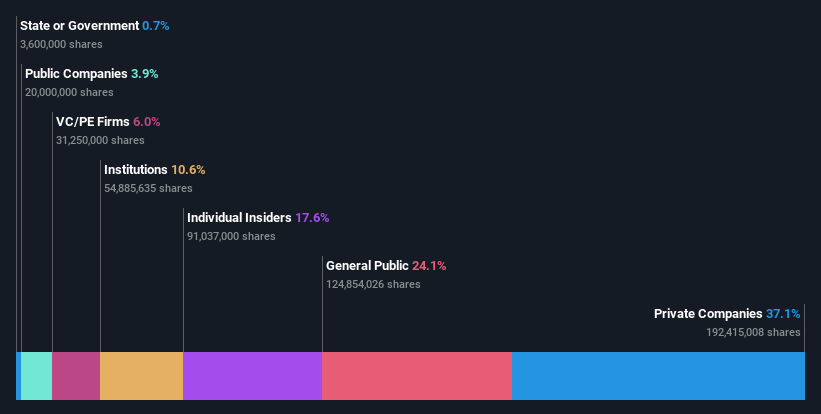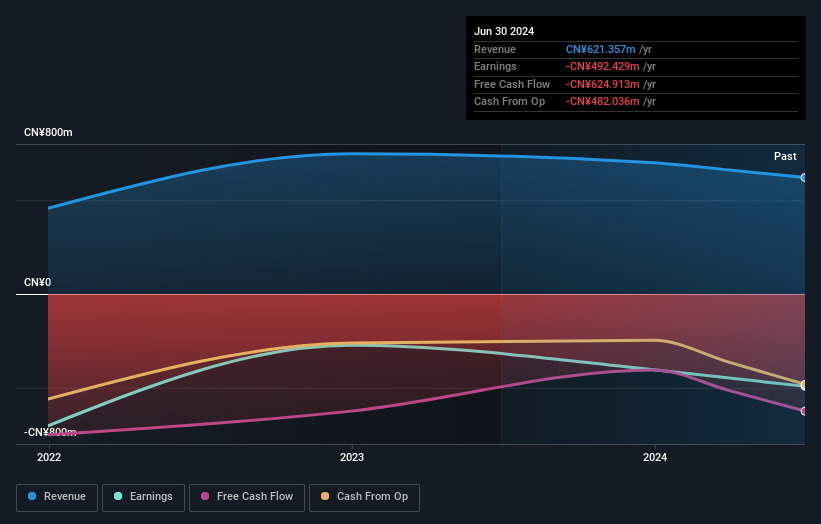- Hong Kong
- /
- Electrical
- /
- SEHK:9663
Sino-Synergy Hydrogen Energy Technology (Jiaxing) Co., Ltd.'s (HKG:9663) market cap dropped HK$477m last week; Private companies bore the brunt

Key Insights
- Sino-Synergy Hydrogen Energy Technology (Jiaxing)'s significant private companies ownership suggests that the key decisions are influenced by shareholders from the larger public
- The top 7 shareholders own 53% of the company
- 18% of Sino-Synergy Hydrogen Energy Technology (Jiaxing) is held by insiders
To get a sense of who is truly in control of Sino-Synergy Hydrogen Energy Technology (Jiaxing) Co., Ltd. (HKG:9663), it is important to understand the ownership structure of the business. We can see that private companies own the lion's share in the company with 37% ownership. Put another way, the group faces the maximum upside potential (or downside risk).
And last week, private companies endured the biggest losses as the stock fell by 5.0%.
Let's take a closer look to see what the different types of shareholders can tell us about Sino-Synergy Hydrogen Energy Technology (Jiaxing).
See our latest analysis for Sino-Synergy Hydrogen Energy Technology (Jiaxing)

What Does The Institutional Ownership Tell Us About Sino-Synergy Hydrogen Energy Technology (Jiaxing)?
Many institutions measure their performance against an index that approximates the local market. So they usually pay more attention to companies that are included in major indices.
Sino-Synergy Hydrogen Energy Technology (Jiaxing) already has institutions on the share registry. Indeed, they own a respectable stake in the company. This can indicate that the company has a certain degree of credibility in the investment community. However, it is best to be wary of relying on the supposed validation that comes with institutional investors. They too, get it wrong sometimes. If multiple institutions change their view on a stock at the same time, you could see the share price drop fast. It's therefore worth looking at Sino-Synergy Hydrogen Energy Technology (Jiaxing)'s earnings history below. Of course, the future is what really matters.

We note that hedge funds don't have a meaningful investment in Sino-Synergy Hydrogen Energy Technology (Jiaxing). From our data, we infer that the largest shareholder is Xiaomin Chen (who also holds the title of Top Key Executive) with 15% of shares outstanding. Its usually considered a good sign when insiders own a significant number of shares in the company, and in this case, we're glad to see a company insider play the role of a key stakeholder. With 13% and 6.0% of the shares outstanding respectively, Guangdong Foshan (Yunfu) Industrial Transfer Industrial Park Investment Development Co., Ltd. and Jiaxing Nanhu Equity Investment Fund Co., Ltd. are the second and third largest shareholders. Additionally, the company's CEO Zeyun Yang directly holds 1.0% of the total shares outstanding.
We also observed that the top 7 shareholders account for more than half of the share register, with a few smaller shareholders to balance the interests of the larger ones to a certain extent.
Researching institutional ownership is a good way to gauge and filter a stock's expected performance. The same can be achieved by studying analyst sentiments. We're not picking up on any analyst coverage of the stock at the moment, so the company is unlikely to be widely held.
Insider Ownership Of Sino-Synergy Hydrogen Energy Technology (Jiaxing)
While the precise definition of an insider can be subjective, almost everyone considers board members to be insiders. Company management run the business, but the CEO will answer to the board, even if he or she is a member of it.
Most consider insider ownership a positive because it can indicate the board is well aligned with other shareholders. However, on some occasions too much power is concentrated within this group.
Our information suggests that insiders maintain a significant holding in Sino-Synergy Hydrogen Energy Technology (Jiaxing) Co., Ltd.. It is very interesting to see that insiders have a meaningful HK$1.6b stake in this HK$9.1b business. Most would be pleased to see the board is investing alongside them. You may wish to access this free chart showing recent trading by insiders.
General Public Ownership
The general public-- including retail investors -- own 24% stake in the company, and hence can't easily be ignored. While this group can't necessarily call the shots, it can certainly have a real influence on how the company is run.
Private Equity Ownership
With a stake of 6.0%, private equity firms could influence the Sino-Synergy Hydrogen Energy Technology (Jiaxing) board. Some might like this, because private equity are sometimes activists who hold management accountable. But other times, private equity is selling out, having taking the company public.
Private Company Ownership
It seems that Private Companies own 37%, of the Sino-Synergy Hydrogen Energy Technology (Jiaxing) stock. Private companies may be related parties. Sometimes insiders have an interest in a public company through a holding in a private company, rather than in their own capacity as an individual. While it's hard to draw any broad stroke conclusions, it is worth noting as an area for further research.
Public Company Ownership
It appears to us that public companies own 3.9% of Sino-Synergy Hydrogen Energy Technology (Jiaxing). It's hard to say for sure but this suggests they have entwined business interests. This might be a strategic stake, so it's worth watching this space for changes in ownership.
Next Steps:
While it is well worth considering the different groups that own a company, there are other factors that are even more important. Consider for instance, the ever-present spectre of investment risk. We've identified 2 warning signs with Sino-Synergy Hydrogen Energy Technology (Jiaxing) (at least 1 which shouldn't be ignored) , and understanding them should be part of your investment process.
If you would prefer check out another company -- one with potentially superior financials -- then do not miss this free list of interesting companies, backed by strong financial data.
NB: Figures in this article are calculated using data from the last twelve months, which refer to the 12-month period ending on the last date of the month the financial statement is dated. This may not be consistent with full year annual report figures.
New: Manage All Your Stock Portfolios in One Place
We've created the ultimate portfolio companion for stock investors, and it's free.
• Connect an unlimited number of Portfolios and see your total in one currency
• Be alerted to new Warning Signs or Risks via email or mobile
• Track the Fair Value of your stocks
Have feedback on this article? Concerned about the content? Get in touch with us directly. Alternatively, email editorial-team (at) simplywallst.com.
This article by Simply Wall St is general in nature. We provide commentary based on historical data and analyst forecasts only using an unbiased methodology and our articles are not intended to be financial advice. It does not constitute a recommendation to buy or sell any stock, and does not take account of your objectives, or your financial situation. We aim to bring you long-term focused analysis driven by fundamental data. Note that our analysis may not factor in the latest price-sensitive company announcements or qualitative material. Simply Wall St has no position in any stocks mentioned.
About SEHK:9663
Sino-Synergy Hydrogen Energy Technology (Jiaxing)
Engages in the research, development, production, and sale of hydrogen fuel cell stacks and systems in the People’s Republic of China.
Excellent balance sheet and overvalued.
Similar Companies
Market Insights
Community Narratives




